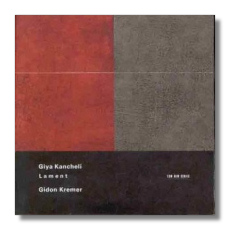
The Internet's Premier Classical Music Source
Related Links
- Kancheli Reviews
- Latest Reviews
- More Reviews
-
By Composer
-
Collections
DVD & Blu-ray
Books
Concert Reviews
Articles/Interviews
Software
Audio
Search Amazon
Recommended Links
Site News
 CD Review
CD Review
Giya Kancheli

Lament
Gidon Kremer, violin
Maacha Deubner, soprano
Tbilisi Symphony Orchestra/Jansug Kakhidze
ECM New Series 1656 (465138-2)
"Lament" for whom, or for what, where, or when? The work is subtitled "Music of mourning in memory of Luigi Nono," the Italian composer, but familiarity has led me to suspect that Giya Kancheli's net is broader than that. A clue comes from Hans Sahl's poem "Stanzas," whose text is dispersed throughout this 42-minute work. The poem's "I" is "walking out of time/into a future farther than any star,/and what I was and am and ever shall be/as patient, as unhurried walks with me/as though I'd never been or hardly been." Could it be that what is mourned is nothing less than loss of identity? Whether we define identity in terms of the personal or of the communal is an interesting question, and one that Kancheli, a self-imposed exile, must have asked himself many, many times.
Musically, Lament will hold few surprises to those who have been following Kancheli's work for the past decade. It is music that has been shattered like the pieces of a glass globe hurled from a great height, and yet the shards remain beautiful (but sharp!), and the patterns that they make are as viable as the original structure was. Form and function have not been destroyed, only transfigured. The music begins as a few isolated glimmers of sound, but soon larger fragments of melody and rhythm collect themselves. From time to time there are comments from the violin (frequently in the highest, unearthly part of its range, but sometimes rich and cello-like) and a disembodied, pure phrase from the soprano. Keyboard instruments (piano, harpsichord, celesta) catch the music's lights and diffract it back. Most of Lament is very quiet, but there are frightening orchestral outbursts – hammering, intentionally banal and commonplace – that jar the listener out of whatever "future farther than a star" he or she has been voyaging in. Lament bears a great deal of similarity to Kancheli's Exil, another work based on texts by Sahl, and also available on ECM New Series. I think it's safe to say that if you enjoy one, you will enjoy the other.
The performances, made under the supervision of the composer in Tbilisi (Tiflis), seem to be ideal. Maacha Deubner's voice is gorgeous yet neutral, like that of an angel not quite ready to announce its physical presence. Kremer effaces himself for the sake of the music. If you set your system's volume level based on the disc's opening minutes, you will be running for cover at the first climax. This, I feel, is exactly what Kancheli had in mind.
Although this is a short CD, what could come after Lament ? This is one of the best fruits of the Kancheli/ECM New Series collaboration.
Copyright © 2000, Raymond Tuttle


















